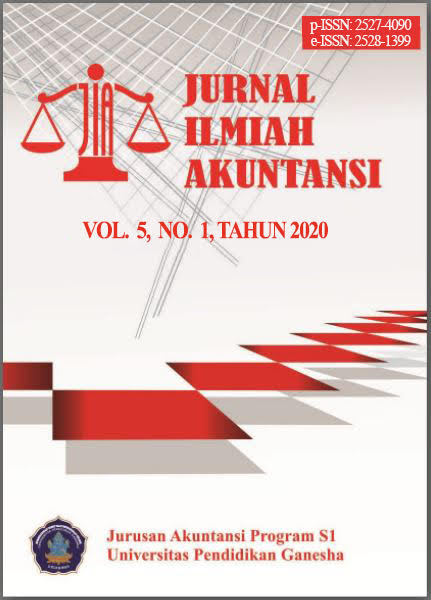Faktor-faktor Pendukung Pencegahan Fraud pada Bank Perkreditan Rakyat
DOI:
https://doi.org/10.23887/jia.v5i1.24275Abstract
This study aims to determine whether the understanding of Risk Based Internal Audit, Whistleblowing System, anti-fraud awareness, and the application of the principles of Good Corporate Governance affect the prevention of fraud in Rural Credit Banks in Bali Province. This study uses primary data sources, using instruments in the form of questionnaires. The population used in this study were auditor internal and bord of directors from 134 Rural Credit Banks and the sample used was auditor internal from 57 Rural Credit Banks taken purposive sampling. The analytical method used is quantitative analysis that is multiple linear analysis using SPSS test equipment. t test results show that Risk Based Internal Audit, Whistleblowing System, Anti-Fraud awareness, and the application of the principles of Good Corporate Governance each have a positive effect on Fraud prevention
References
Adrian, S. (2011). Good Corporate Governance. Jakarta: Sinar Grafika.
Albrecht, W. S., Albrecht, C. O., Albrecht, C. C., & Zimbelman, M. F. (2012). Fraud Examination. Mason, USA: South Western, Cengange Learning.
Alexander, C., & Cumming, D. (2020). Corruption and Fraud in Financial Market: Malpractice, Misconduct and Manipulation. New Jersey, USA: John Wiley & Sons, Inc.
Azriani, Z., Harianto, & Nuryantono, N. (2008). Peranan Bank Perkreditan Rakyat Terhadap Kinerja Usaha Kecil di Sumatera Barat. Forum Pascasarjana, 31(3), 173–188.
Bank Indonesia. (2011). Surat Edaran Bank Indonesia No. 13/28/DPNP tentang Penerapan Strategi Anti Fraud bagi Bank Umum.Governance, K. N. K. C. 2004. Pedoman Good Corporate Governance Perbankan Indonesia., 1–17.
Cressey, D. R. (1953). Other People’s Money: A Study in the Social Psychology of Embezzlement. New York: The Free Press.
Dewi, R., Rozali, Y., & Mohammad, J. (2015). Pengaruh Pelaksanaan Risk Based Internal Auditing terhadap Pencegahan Fraud (Studi Kasus Pada Audit Internal Kantor Inspeksi Bank BRI Wilayah Bandung). JRAK (Jurnal Riset Akuntansi Dan Keuangan), 3(3), 831–836.
Indriani, M., Yulia, A., Nadirsyah, N., & Ariska, L. P. (2019). Whistleblowing Intention, Personal Cost, Organizational Commitment and Fraud Seriousness Level. Journal of Accounting and Investment, 20(2), 129–151. https://doi.org/10.18196/jai.2002121
Jannah, S. F. (2016). Pengaruh Good Corporate Governance Terhadap Pencegahan Fraud Di Bank Perkreditan Rakyat (Studi Pada Bank Perkreditan Rakyat Di Surabaya). AKRUAL: Jurnal Akuntansi, 7(2), 177–191. https://doi.org/10.26740/jaj.v7n2.p178-191
Komite Nasional Kebijakan Governance. (2008). Pedoman Sistem Pelaporan Pelanggaran-SPP (Whistleblowing System-WBS). Jakarta: Komite Nasional Kebijakan Governance.
Libramawan, I. P. (2014). Pengaruh Penerapan Whistleblowing System terhadap Pencegahan Kecurangan (Studi Survey pada PT Coca-Cola Amatil Indonesia So Bandung). Universitas Widyatama Bandung.
Mayasari, M., Setiyanto, A. I., & Irawati, R. (2019). Pengaruh Faktor-faktor Individual terhadap Niat Melakukan Whistle-Blowing Internal dan Eksternal pada Akuntan Di Batam (Studi Kasus Politeknik Negeri Batam). Jurnal Gama Societa, 2(1), 48–53. https://doi.org/10.22146/jgs.40425
Miller, G. P. (2017). The Law of Governance, Risk Manajemen and Compliance (Second ed.). New York: Wolters Kluwer.
Nadia, F. A., Sukarmanto, E., & Purnamasari, P. (2018). Pengaruh Pengendalian Internal dan Good Corporate Governance terhadap Pencegahan Fraud. Prosiding Akuntansi: SPESIA (Seminar Penelitian Sivitas Akademika Unisba), 4(2), 861–868. https://doi.org/10.20885/jaai.vol17.iss1.art5
Otoritas Jasa Keuangan. (2016). Badan Perkreditan Rakyat. Retrieved January 13, 2020, from https://www.ojk.go.id/id/kanal/perbankan/Pages/Bank-Perkreditan-Rakyat.aspx
Rudi. (2017). Manajemen Risiko Bank Perkreditan Rakyat dan Pengaruhnya terhadap Non Performing Loan (Study Kasus BPR di Kota Tangerang Selatan). Jurnal Sekuritas: Saham, Ekonomi, Keuangan Dan Investasi), 1(1), 59–77.
Sari, D. N., & Laksito, H. (2014). Profesionalisme Internal Auditor dan Intensi Melakukan Whistleblowing. Diponegoro
Journal Of Accounting, 3(3), 267–274.
Saud, I. M. (2016). Pengaruh Sikap dan Persepsi Kontrol Perilaku Terhadap Niat Whistleblowing Internal-Eksternal dengan Persepsi Dukungan Organisasi Sebagai Variabel Pemoderasi. Jurnal Akuntansi Dan Investasi, 17(2), 209–219. https://doi.org/10.18196/jai.2016.0056.209-219
Setianto, V. Y., Utami, I., & Novianti, S. (2016). Whistleblowing dalam Tekanan Ketaatan dan Kepercayaan pada Pimpinan. Jurnal Ekonomi Dan Bisnis, 19(3), 485–511. https://doi.org/10.24914/jeb.v19i3.607
Sofia, A., Herawati, N., & Zuhdi, R. (2013). Kajian Empiris tentang Niat Whistleblowing Pegawai Pajak. JAFFA, 1(1), 23–38.
Suginam. (2017). Pengaruh Peran Audit Internal dan Pengendalian Intern TerhadapPencegahan Fraud ( Studi Kasus pada PT. Tolan Tiga Indonesia). OWNER: RISET & JURNAL AKUNTANSI, 1(1), 22–28.
Suryono, E., & Chariri, A. (2016). Sikap, Norma Subjektif, dan Intensi Pegawai Negeri Sipil untuk Mengadukan Pelanggaran (Whistle-Blowing). Jurnal Akuntansi Dan Keuangan Indonesia, 13(1), 102–116.
Tuanakotta, T. M. (2013). Audit Berbasis ISA (International Standards on Auditing). Jakarta: Salemba Empat.
Wardana, I. G. A. K., Sujana, E., & Wahyuni, M. A. (2017). Pengaruh Pengendalian Internal, Whistleblowing System Dan Moralitas Aparat Terhadap Pencegahan Fraud Pada Dinas Pekerjaan Umum Kabupaten Buleleng. E-Journal S1 Akuntansi Universitas Pendidikan Ganesha, 8(2), 1–10.
Wardani, C. A., & Sulhani. (2017). Analisis Faktor faktor yang Mempengaruhi Penerapan Whistleblowing System di Indonesia. Jurnal Aset (Akuntansi Riset), 9(1), 29–44. https://doi.org/10.17509/jaset.v9i1.5255
Wulandari, D. N., & Nuryanto, M. (2018). Pengaruh Pengendalian Internal, Kesadaran Anti-Fraud, Integritas, Independensi, dan Profesionalisme Terhadap Pencegahan Kecurangan. Jurnal Riset Akuntansi Mercu Buana, 4(2), 117. https://doi.org/10.26486/jramb.v4i2.557
Zarefar, A., & Arfan, T. (2017). Efektivitas Whistleblowing System Internal. Jurnal Akuntansi Keuangan Dan Bisnis, 10(2), 25–33.



1.png)


